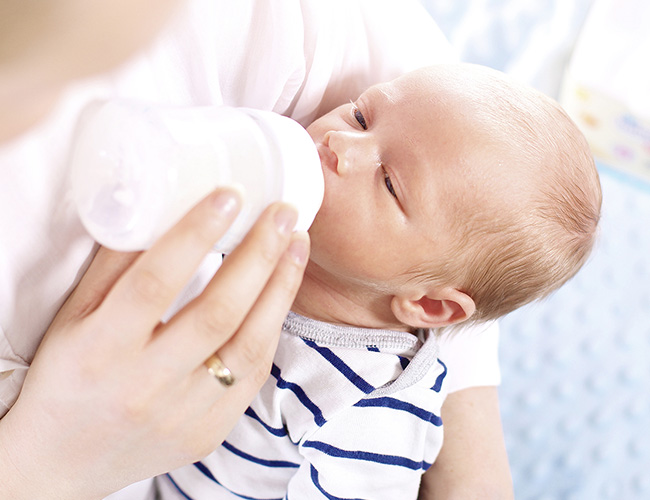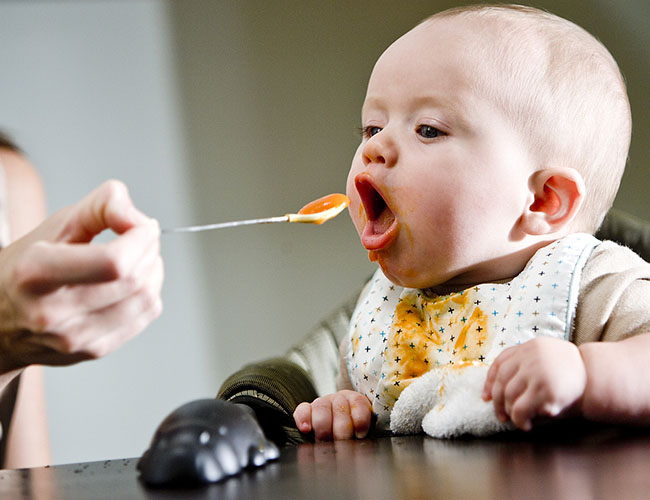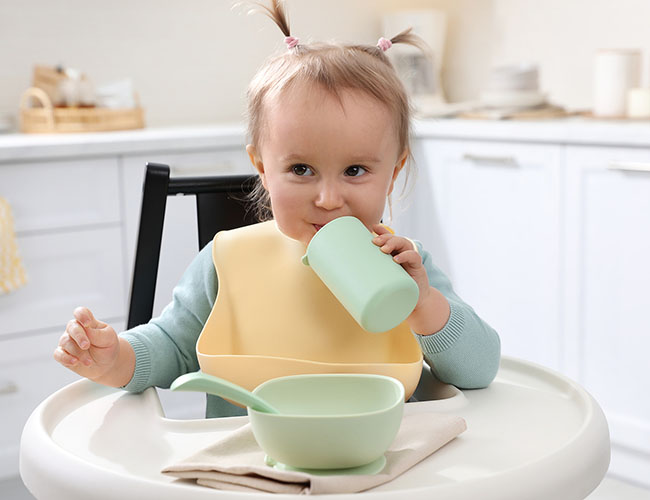Feeding Milestones for Feeding Therapy
Feeding milestones refer to the typical developmental stages your child goes through as they learn to eat and drink independently. These milestones cover a range of sensory, motor, and coordination skills that should develop over time. For your convenience, RISE Pediatric Therapies (RPT) has provided a general timeline of feeding milestones from infancy to early childhood. If you have any questions, please Contact us at (407) 904-1600 for more information. Located in West Orange County, we serve Orlando, FL, and the surrounding areas.
-

Birth to 4 Months
Your baby should primarily be receiving all their nutrition via breastfeeding or bottle feeding. During this time, your baby should be demonstrating the following skills:
- Reflexive sucking and rooting reflex to latch to breast or bottle
- Suck-swallow-breathe coordination
- Tongue moves forward and backward for sucking
-

4 to 6 Months
If your child demonstrates the development milestones below, you can start small amounts of thin pureed foods:
- Has stable head control while in seated position (no head bobbing)
- Is able to sit independently for 3-5 minutes
In order to identify if your child is ready for purees and spoon feeding, your child should show interest in food and open their mouth when offered a spoon. If your child is not yet showing interest in food or does not yet have developmental skills for sitting, you can support your child with hand-to-mouth play for independent oral exploration of objects.
-

6 to 9 Months
At this time your child can be introduced to thicker purees and mashed foods. Your child may begin to show an interest in self-feeding with their hands or with a spoon with your assistance. Your child should begin to demonstrate the following skills.
- moving food from side to side in their mouth,
- beginning to munch with an up-and-down jaw motion,
- drinking from a sippy cup, straw cup, or open cup with support, and
- closing lips during feeding to support movement of food back to swallow.
-

9 to 12 Months
At this time your child can begin to explore more textured foods. Your child can self-feed soft pieces of food (i.e., scrambled eggs and banana pieces) and meltable hard solids (i.e., graham crackers and biter biscuits). Your child should begin to demonstrate the following skills:
- Pincer grasp develops, allowing for self-feeding with small pieces of textured foods,
- More circular motion of chewing begins to develop,
- More independent with straw drinking and sipping with a cup with less spillage,
- Discontinued use of pacifier/thumb sucking by 12 months of age,
- Discontinued use of bottles by 12 months of age, and
- Disappearance of gagging by 10 months of age.
-

12 to 18 Months
At this time, your child should be demonstrating efficient finger feeding and begin practicing utensil use for further independent feeding. You can introduce your child to a wider variety of soft table foods and mixed textures. It is important to introduce mixed textures at 12 months of age and NOT earlier to ensure your child has had adequate time to develop safe, efficient feeding with single textures. Your child should be demonstrating the following skills:
- Uses their tongue to move food efficiently to all areas of their mouth
- Begins coordinated chewing (circular and vertical) to safely break down food
- Drinks more confidently from a straw or open cup
-

18 to 24 Months
At this time your child should be able to eat a wide variety of foods, including most table foods in appropriate sizes. He or she is beginning to show food preferences. Your child should be demonstrating the following skills:
- Shows increasing independence with utensil use (your child may not be efficient until after 24 months of age)
- Bites food with front teeth and chews with back molars (if present)
- Begins to drink from an open cup without assistance
Red Flags in Feeding Development
- Ongoing poor weight gain or weight loss
- Ongoing problems with vomiting
- An infant who cries and/or arches at most meals
- An infant who struggles to coordinate sucking-swallowing-breathing at breast or bottle
- Persistent coughing or choking during meals
- Persistent gagging during meals after the age of 10 months
- Delayed chewing or inability to manage food pieces
- Prolonged use of bottle feeding beyond 18 months of age
- Strong aversion to textures or refusal to eat certain foods
- Difficulty transitioning from purees to solids
- Difficulty transitioning from bottle to cup

Pediatric Feeding Milestones
Please use this list of feeding milestones from RISE Pediatric Therapies to gauge your child’s progress during the early stages of development. Need help with feeding therapy? Contact us at (407) 904-1600 for more information. Located in West Orange County, we serve Orlando, FL, and the surrounding areas including Horizon West, Apopka, Orange County, and Lake County.